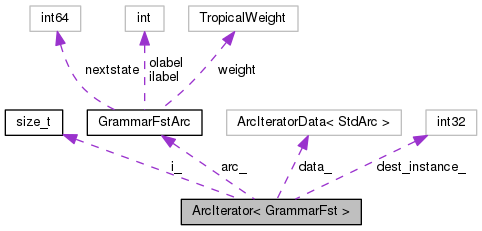This is the overridden template for class ArcIterator for GrammarFst. More...
#include <grammar-fst.h>

Public Types | |
| using | Arc = typename GrammarFst::Arc |
| using | BaseArc = StdArc |
| using | StateId = typename Arc::StateId |
| using | BaseStateId = typename StdArc::StateId |
| using | ExpandedState = GrammarFst::ExpandedState |
Public Member Functions | |
| ArcIterator (const GrammarFst &fst_in, StateId s) | |
| bool | Done () |
| void | Next () |
| const Arc & | Value () const |
Private Member Functions | |
| void | CopyArcToTemp () |
Private Attributes | |
| ArcIteratorData< StdArc > | data_ |
| int32 | dest_instance_ |
| size_t | i_ |
| Arc | arc_ |
This is the overridden template for class ArcIterator for GrammarFst.
This is only used in the decoder, and the GrammarFst is not a "real" FST (it just has a very similar-looking interface), so we don't need to implement all the functionality that the regular ArcIterator has.
Definition at line 496 of file grammar-fst.h.
| using Arc = typename GrammarFst::Arc |
Definition at line 498 of file grammar-fst.h.
Definition at line 499 of file grammar-fst.h.
| using BaseStateId = typename StdArc::StateId |
Definition at line 501 of file grammar-fst.h.
Definition at line 502 of file grammar-fst.h.
| using StateId = typename Arc::StateId |
Definition at line 500 of file grammar-fst.h.
|
inline |
Definition at line 506 of file grammar-fst.h.
References GrammarFst::ExpandedState::arcs, data_, GrammarFst::ExpandedState::dest_fst_instance, GrammarFst::FstInstance::fst, GrammarFst::GetExpandedState(), GrammarFst::instances_, and KALDI_GRAMMAR_FST_SPECIAL_WEIGHT.
|
inlineprivate |
|
inline |
Definition at line 540 of file grammar-fst.h.
References data_.
Referenced by fst::CopyToVectorFst().
|
inline |
|
inline |
|
private |
Definition at line 583 of file grammar-fst.h.
|
private |
Definition at line 576 of file grammar-fst.h.
|
private |
Definition at line 579 of file grammar-fst.h.
|
private |
Definition at line 581 of file grammar-fst.h.